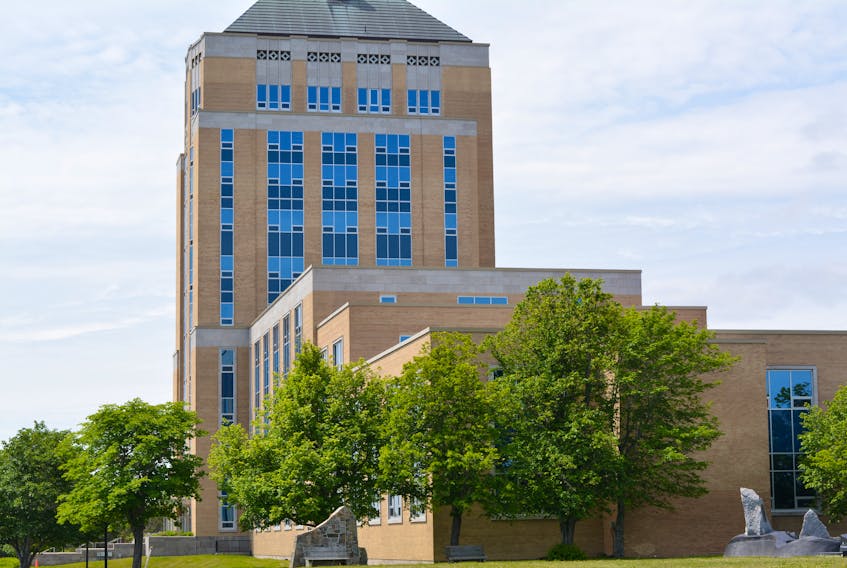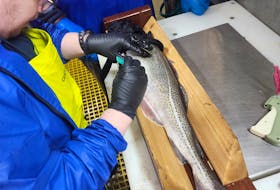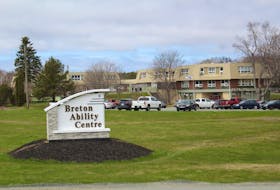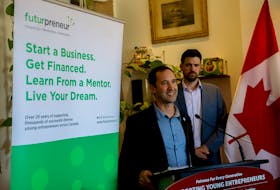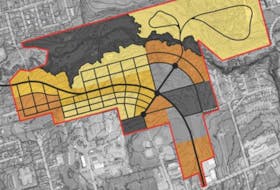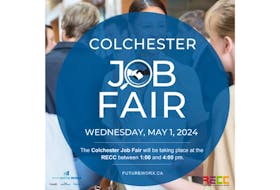The year 2020 has been tough for businesses in Newfoundland and Labrador, as well as the provincial government.
The COVID-19 pandemic forced many businesses to close for multiple months. When they did reopen, it was far from business as usual, with public health restrictions requiring them to rethink how they operate.
As for the government, expenses have increased and revenue is down, with much of the latter attributed to a substantial decrease in oil revenues. In July, the province was projecting a $2.1-billion deficit for 2020-21, forcing it to borrow $3.2 billion to make it through the fiscal year.
So far, interim supply bills have kept government business chugging along, and the provincial budget will finally be unveiled Wednesday. Given what a challenging year it’s been, the business community will be keen to see what's included.

Support welcome
AnnMarie Boudreau, CEO of the St. John's Board of Trade, said her members will welcome any form of support offered in the budget to address the needs of the business community.
"As we all know, 2020 has been an extremely tough year for a variety of reasons, not the least of which, of course, is COVID-19," she said. "We're really hoping to see some support for our membership and the business community in general, particularly the small-to-medium-sized businesses who really could use a little bit of financial assistance right now."
"I suspect this one may just go by without a whole lot of controversy, but I think the discussions and the debates and the back-and-forth will happen after this as we head into another election sometime before too long," — Mary Shortall
Vaughn Hammond, Canadian Federation of Independent Business' director of provincial affairs for Newfoundland and Labrador, wants government to be cognizant of what the deficit means to Newfoundland and Labrador's growing debt problem and find ways to scale back spending. He said the amount of money borrowed compared to the size of the province's budget is not sustainable.
"This isn't really common. The COVID-19 crisis has thrown a grenade in everything and blown everything up," Hammond said. "But from our perspective, this government, if it wants to spend, it's going to have to borrow. And what that means is as we go into future years that we're going to have to pay that debt off, if not pay the interest on it. There's a conundrum there, and from our perspective, there's ways the provincial government can find saving in their budget that won't have an adverse effect on public services."

Richard Alexander, executive director of the Newfoundland and Labrador Employers' Council, likewise believes the province must address its debt situation, adding it ties in directly with the economy moving forward.
"When we're faced with such a massive issue like the provincial treasury has now — $16.7 billion (in net debt) — what we need is war-time leadership," Alexander said. "We need a premier and a finance minister that are going to level with the people and say, 'Look, this is a massive problem that's going to take our collective efforts, everybody together — businesses, labour and the general public — under the leadership of this government to deal with this.' They need to offer hope ... By dealing with it, things will get better. And when things get better, you'll see business confidence increase. Businesses won't be afraid to invest, and that'll help grow the economy. Ignoring the problem is not an option."
Likely low-key
But Newfoundland and Labrador Federation of Labour president Mary Shortall does not expect to see that happen in this fiscal year. Noting it is the first budget for Premier Andrew Furey, who is in the middle of a byelection campaign to sit in the House of Assembly, Shortall said the real battle will likely come in the months ahead.
"I suspect this one may just go by without a whole lot of controversy, but I think the discussions and the debates and the back-and-forth will happen after this as we head into another election sometime before too long," Shortall said.

Alexander similarly does not believe this budget will introduce much in the way of big changes, though he will be interested in listening to what Finance Minister Siobhan Coady and the premier have to say.
"I think we're going to see a bit of a status-quo budget with very little movement, but what we would very much like to see is an indication or strong messaging coming from the new premier and the new finance minister that they're going to be honest with the people and that they're going to level with the people and tell them how big the problem is, and that they're actually willing to provide that leadership we need to once and for all deal with that massive, massive issue," he said.
As always, Shortall said her organization is dead set against austerity measures. She would hope to see the province consider how the federal government has acted in response to the economic challenges the pandemic has presented.
"We've always asked for an economy that's always rich in good jobs for everyone, an economy that invests in a strong sector and quality public services, and one that supports families, small communities, small business and respects the environment," she said.
"Why are they picking winners and losers? In the 2019 budget last year, they had allotted $115 million for what they called jobs and industry development. But is the economy really going to be better off for that kind of government spending? — Vaughn Hammond
Boudreau knows the federal programs addressing subsidized wages and rent relief have helped a lot of members of her organization. She hopes to see the province offer additional forms of support in the coming months
"We have been consistently advocating to the provincial government through various departments to put something there for businesses to avail of and to help them through the rest of what COVID-19 has in store for us and to just really get them over the hump right now, so that they can survive and get back on their feet," Boudreau said.
Growing economy
Acknowledging there are fiscal challenges hanging over government, Shortall said it cannot lose sight of the need to invest in the public sector and public services, noting the economy cannot grow without people having money in their pockets to spend at local businesses.
"We don't want debt-filled consumption, we want wage-led growth," she said. "If we're going to ask for people to stay here and work here and live here in the province or come invest in Newfoundland and Labrador as a province, we need to make sure the services are there for them and their families."
In terms of ways to reduce spending without hurting public services, Hammond and Alexander both believe health care, the province's biggest budget item, should be looked at.
Alexander suggests the COVID-19 pandemic has proven that to be the case.
"Just to use health care as an example, where everything we were doing in health care was you had to go to the hospital and get it done," he said. "Then COVID hit and showed us that, you know what, there are different ways of doing things, and they're more efficient and you get better access and you can get better outcomes. But politicians are very hesitant to address reforming health care to make it affordable and actually improve health outcomes to the people of the province."

Hammond said it is time to take a look at Memorial University's tuition freeze. Knowing, too, the provincial government is not in a position to take on an equity stake in Husky Energy's West White Rose oil project, he would suggest the government should move away from funding any sort of industry development.
"Why are they picking winners and losers? In the 2019 budget last year, they had allotted $115 million for what they called jobs and industry development. But is the economy really going to be better off for that kind of government spending? We don't know," he said.
Hammond would also like to see more transparency around the use of attrition to reduce public sector spending. Meanwhile, off in the distance loom the issues of Muskrat Falls rate mitigation measures and debt management.
"Maybe it's overly ambitious to look for a huge, multi-year plan coming out of this budget given COVID-19 and whatnot, but at the very least, what we could look for is a really accurate picture in terms of what government's finances are going to be for 2020-2021," he said.

